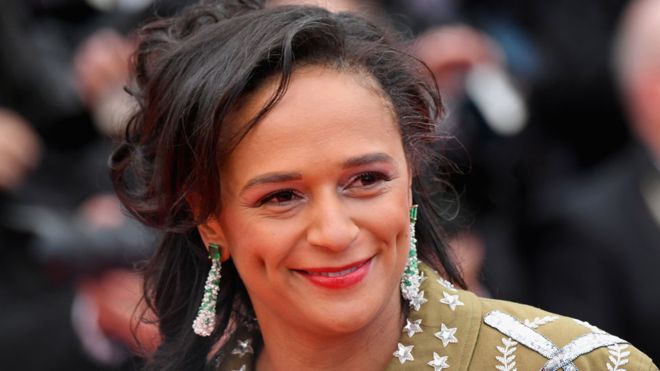Leaked documents reveal how Africa’s richest woman made her fortune through exploiting her own country, and corruption.
Isabel dos Santos got access to lucrative deals involving land, oil, diamonds and telecoms when her father was president of Angola, a southern African country rich in natural resources.
The documents show how she and her husband were allowed to buy valuable state assets in a series of suspicious deals.
Ms Dos Santos says the allegations against her are entirely false and that there is a politically motivated witch-hunt by the Angolan government.
The former president’s daughter has made the UK her home and owns expensive properties in central London.
She is already under criminal investigation by the authorities in Angola for corruption and her assets in the country have been frozen.
Now BBC Panorama has been given access to more than 700,000 leaked documents about the billionaire’s business empire.
Most were obtained by the Platform to Protect Whistle-blowers in Africa and shared with the International Consortium of Investigative Journalists (ICIJ).
They’ve been investigated by 37 media organisations including The Guardian and Portugal’s Expresso newspaper.
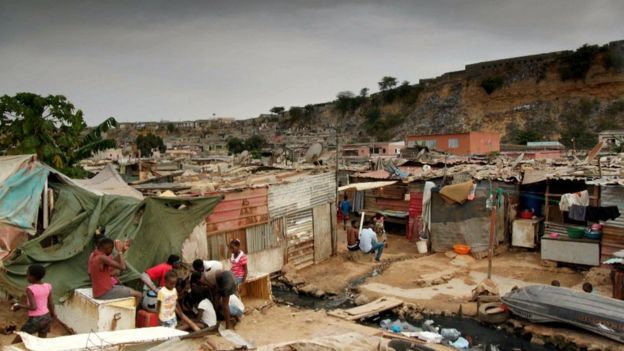
Andrew Feinstein, the head of Corruption Watch, says the documents show how Ms Dos Santos exploited her country at the expense of ordinary Angolans.
“Every time she appears on the cover of some glossy magazine somewhere in the world, every time that she hosts one of her glamorous parties in the south of France, she is doing so by trampling on the aspirations of the citizens of Angola.”
The ICIJ have called the documents The Luanda Leaks.
The oil connection
One of the most suspicious deals was run from London through a UK subsidiary of the Angolan state oil company Sonangol.
Ms Dos Santos had been put in charge of the struggling Sonangol in 2016, thanks to a presidential decree from her father Jose Eduardo dos Santos, who kept a tight grip on his country for the 38 years he was in power.
But when he retired as president in September 2017 her position was soon under threat, even though his hand-picked successor came from the same party. Ms Dos Santos was sacked two months later.
Many Angolans have been surprised at the way that President Joao Lourenço has gone after the business interests of his predecessor’s family.
- 29 million population
- 27-year civil war, fought from independence to 2002
- $4,170 average income, but this masks big disparities
- 30% of population live in poverty – less than $1.90/day
- 2nd biggest oil producer in Africa. Also major diamond producer
Source: World Bank, Opec
The leaked documents show that as she left Sonangol, Ms Dos Santos approved $58m of suspicious payments to a consultancy company in Dubai called Matter Business Solutions.
She says she has no financial interest in Matter, but the leaked documents reveal it was run by her business manager and owned by a friend.
Panorama understands that Matter sent more than 50 invoices to Sonangol in London on the day that she was fired.
Ms Dos Santos appears to have approved payments to her friend’s company after she was sacked.
Although some consultancy work had been carried out by Matter, there’s very little detail on the invoices to justify such large bills.
One asks for €472,196 for unspecified expenses, another asks for $928,517 for unspecified legal services.
Two of the invoices – each for €676,339.97 – are for exactly the same work on the same date and Ms Dos Santos signed them both off anyway.
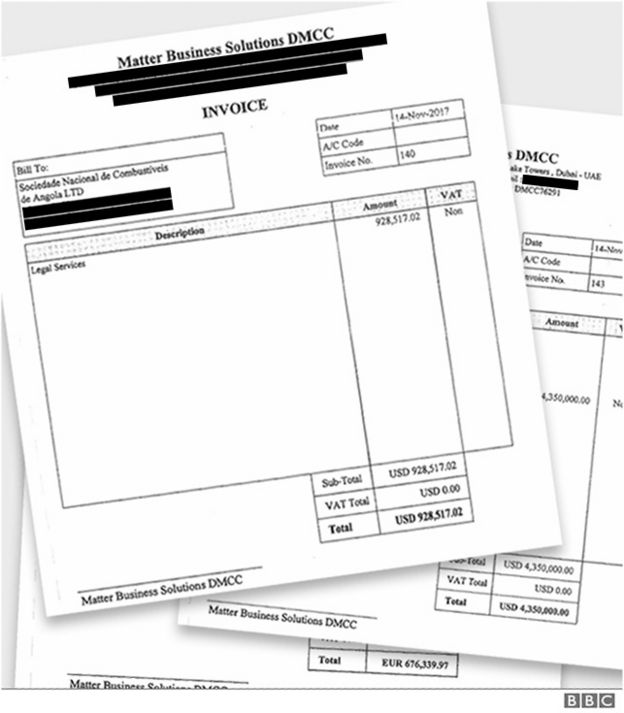

Lawyers for Matter Business Solutions say it was brought in to help restructure the oil industry in Angola, and that the invoices were for work that had already been carried out by other consultancy companies it had hired.
“Regarding the invoices related with expenses, it is common for consultancy companies to add expenses to invoices as a general item. This is often due to those expenses involving large amounts of paperwork… Matter can produce documentary evidence to confirm all expenses incurred.”
Ms Dos Santos’s lawyers said her actions with regard to the Matter payments were entirely lawful and that she had not authorised payments after she had been dismissed from Sonangol.
They said: “All invoices paid were in relation to services contracted and agreed between the two parties, under a contract that was approved with the full knowledge and approval of the Sonangol Board of Directors.”
The ICIJ and Panorama have also uncovered new details about the business deals that made Ms Dos Santos rich.
Much of her fortune is based on her ownership of a stake in the Portuguese energy company Galp, which one of her companies bought from Sonangol in 2006.
The documents show it only had to pay 15% of the price upfront and that the remaining €63m ($70m) was turned into a low-interest loan from Sonangol.
Under the generous terms of the loan, her debt to the Angolan people didn’t have to be repaid for 11 years.
Her stake in Galp is now worth more than €750m.
Ms Dos Santos’s company did offer to repay the Sonangol loan in 2017.
The repayment offer should have been rejected because it didn’t include almost €9m of interest owing.
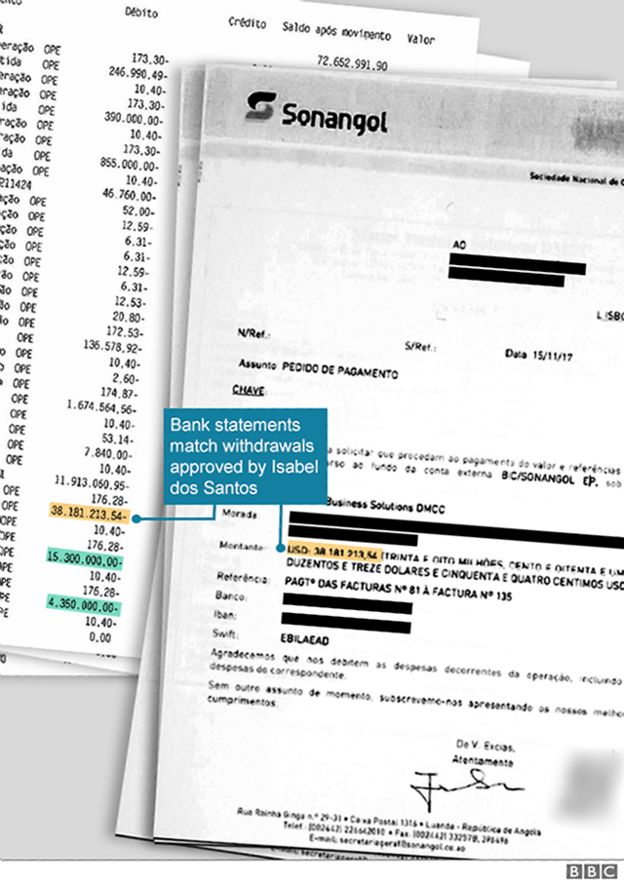

But Ms Dos Santos was in charge of Sonangol at the time and she accepted the money as full payment of her own debt.
She was fired six days later and the payment was returned by the new Sonangol management.
Ms Dos Santos says she initiated the purchase of the stake in Galp, and that Sonangol made money from the deal as well.
“There’s absolutely no wrongdoing in any of those transactions. This investment is the investment that in history has generated the most benefit for the national oil company and all the contracts that were drafted are perfectly legal contracts, there are no wrongdoings.”
Her lawyers say the repayment offer in 2017 covered what Sonangol had indicated was owed.
The diamond connection
It’s a similar story in the diamond industry.
Ms Dos Santos’s husband, Sindika Dokolo, signed a one-sided agreement in 2012 with Angolan state diamond company Sodiam.
They were supposed to be 50-50 partners in a deal to buy a stake in the Swiss luxury jeweller De Grisogono.
But it was funded by the state company. The documents show that 18 months after the deal, Sodiam had put $79m into the partnership, while Mr Dokolo had only invested $4m. Sodiam also awarded him a €5m success fee for brokering the deal, so he didn’t have to use any of his own money.
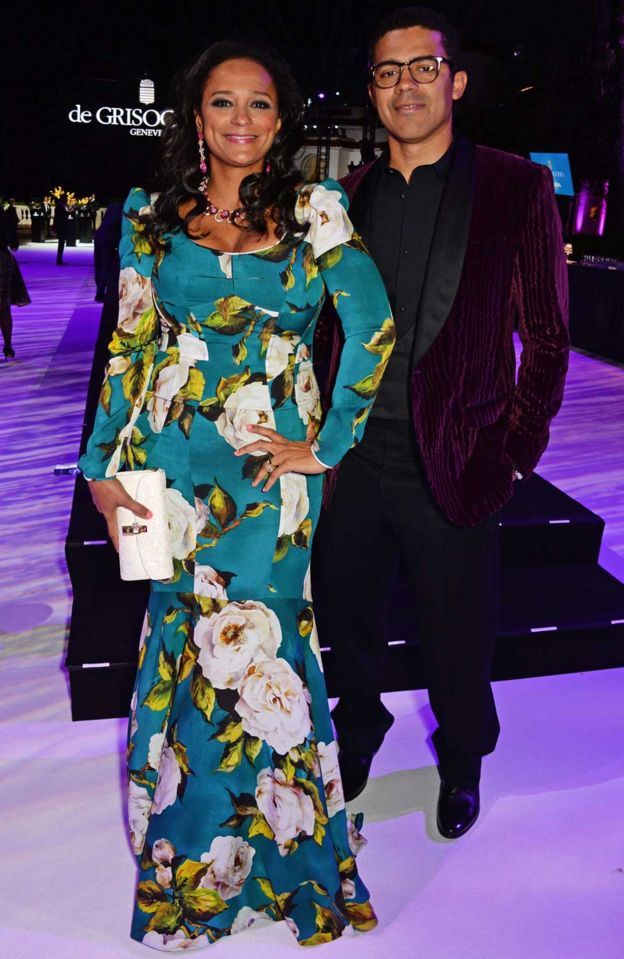

The diamond deal gets even worse for the Angolan people.
The documents reveal how Sodiam borrowed all the cash from a private bank in which Ms Dos Santos is the biggest shareholder.
Sodiam has to pay 9% interest and the loan was guaranteed by a presidential decree from her father, so Ms Dos Santos’s bank cannot lose out.
Bravo da Rosa, the new chief executive of Sodiam, told Panorama that the Angolan people hadn’t got a single dollar back from the deal: “In the end, when we have finished paying back this loan, Sodiam will have lost more than $200m.”
The former president also gave Ms Dos Santos’s husband the right to buy some of Angola’s raw diamonds.



